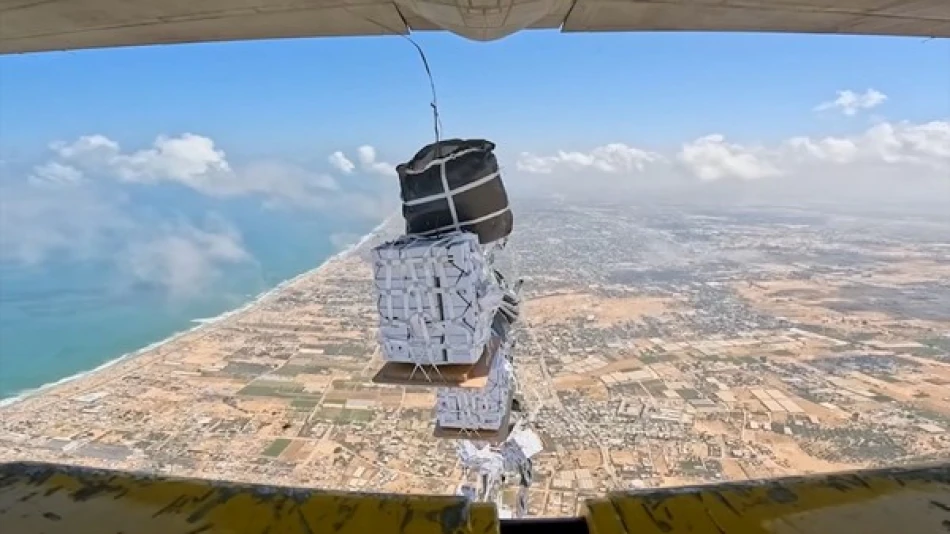
UAE Airlifts 81st Humanitarian Aid Shipment to Gaza as Part of 'Birds of Goodness' Operation
UAE Completes 81st Gaza Aid Drop as International Humanitarian Coalition Expands
The United Arab Emirates has completed its 81st airdrop of humanitarian supplies to Gaza as part of its "Birds of Goodness" operation, marking a significant milestone in what has become one of the region's most sustained relief efforts. The mission, conducted in partnership with Jordan, Germany, and Indonesia, brings the UAE's total aerial aid contributions to over 4,076 tons since operations began.
Multi-National Coalition Strengthens Gaza Relief Efforts
Tuesday's airdrop represents the growing internationalization of Gaza humanitarian assistance, with the UAE successfully coordinating efforts across multiple countries. The inclusion of Germany and Indonesia alongside traditional regional partner Jordan signals a broader diplomatic achievement in building consensus around humanitarian intervention despite complex geopolitical tensions.
The latest shipment consisted primarily of essential food supplies, prepared with support from Emirati charitable organizations and foundations. This grassroots involvement reflects the UAE's strategy of combining state resources with civil society engagement to maximize aid impact.
Strategic Humanitarian Positioning
The UAE's sustained commitment through 81 consecutive airdrops positions the country as a leading humanitarian actor in the Middle East crisis. This approach mirrors the Emirates' broader foreign policy strategy of maintaining pragmatic engagement while building international partnerships across ideological divides.
The "Birds of Goodness" operation demonstrates how middle powers can leverage logistical capabilities and diplomatic networks to address humanitarian crises when larger powers face political constraints. The UAE's geographic position and advanced aviation infrastructure make it an ideal staging ground for sustained relief operations.
Regional Implications and Diplomatic Dividends
The multi-national character of these operations serves multiple strategic purposes beyond immediate humanitarian relief. For the UAE, leading such initiatives enhances its reputation as a responsible regional power while strengthening bilateral relationships with participating countries.
The partnership with Germany, in particular, reflects the UAE's success in engaging European allies in Middle Eastern humanitarian challenges. This cooperation could establish precedents for future crisis response mechanisms and strengthen the Emirates' position as a bridge between Western and regional approaches to conflict resolution.
Operational Scale and Sustainability
With over 4,000 tons delivered across 81 missions, the UAE has demonstrated remarkable operational consistency in challenging circumstances. This scale of sustained aerial delivery requires sophisticated logistics, flight coordination, and supply chain management – capabilities that position the UAE as a regional humanitarian hub.
The involvement of Emirati charitable organizations in preparing supplies suggests a sustainable model that combines government resources with private sector and civil society contributions. This approach could prove more resilient than purely state-driven initiatives, particularly during extended crisis periods.
As humanitarian needs in Gaza continue to mount, the UAE's systematic approach to aid delivery and coalition building may serve as a template for addressing future regional crises where traditional diplomatic channels remain blocked.
Most Viewed News

 Layla Al Mansoori
Layla Al Mansoori






